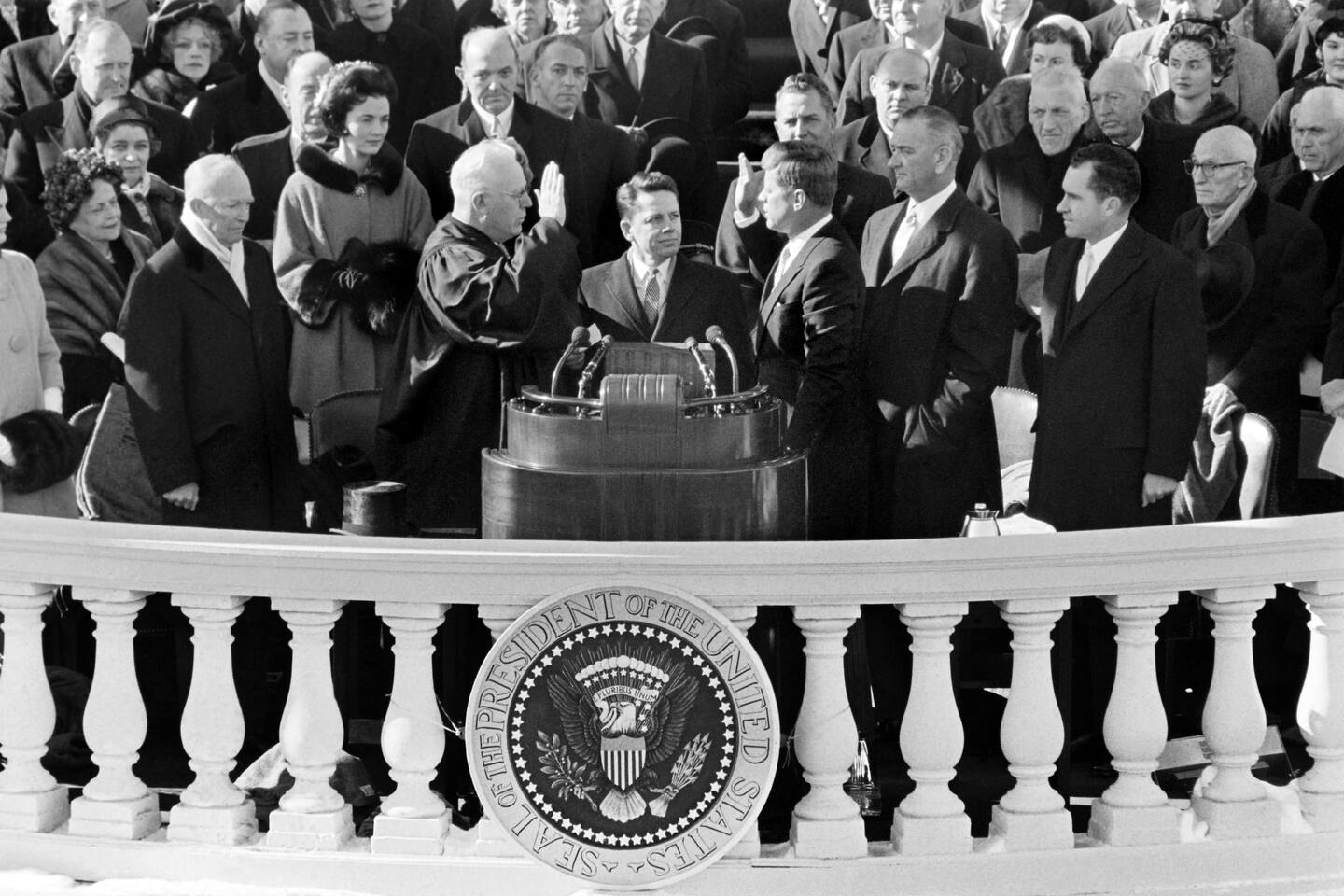Transitions are never easy. Especially this one.

The sound of workmen hammering together reviewing stands for the 1961 inaugural parade put Dwight D. Eisenhower in mind of a condemned man hearing the gallows take shape outside his jail cell. Eight years earlier, in January 1953, it had been Eisenhower replacing Harry S. Truman, a onetime admirer who took offense at Eisenhower’s campaign to succeed him in the Oval Office. Their ceremonial ride to the Capitol — one of those Inauguration Day rituals designed to camouflage personal animosities between individuals not otherwise on speaking terms — felt as awkward as it had a generation earlier for Coolidge and Hoover, and would subsequently for Jimmy Carter and Ronald Reagan, and Barack Obama and Donald Trump.
Sixty years on, it’s easy to forget the torch was passed from Ike to John F. Kennedy following the closest election in memory. An evenly divided electorate confirmed the new president’s legitimacy through televised images of the youngest elected president being welcomed to the White House by the oldest to that time. Time has not dimmed memories of a snowbound capital, and a coatless JFK braving both subfreezing temperatures and a seemingly endless invocation delivered by Boston’s Richard Cardinal Cushing. The inaugural prayer was only slightly shorter than Kennedy’s inaugural address, with its dazzling summons to service and generational change that raised a new standard for presidential rhetoric.
As President-elect Joe Biden balances public ceremony with public health in an escalating covid-19 pandemic, it bears noting that some of our most notable inaugurations have occurred when the country was most polarized. In March 1801 John Adams boycotted the swearing in of his former friend and revolutionary comrade Thomas Jefferson, prompting Jefferson’s plea to his fractious countrymen to “restore to social intercourse that harmony and affection without which liberty, and even life itself, are but dreary things.”
No inauguration could match the drama of March 1861, when Abraham Lincoln rode to the Capitol past sharpshooters posted on rooftops to ensure he lived long enough to assume the leadership of a disintegrating nation — and make his 11th-hour appeal to the better angels of our nature. Three score and 12 years later, at the nadir of the Great Depression, Franklin D. Roosevelt exhorted a nation temporarily unified by hardship. The shriveled economy had taken a sickening plunge on the eve of his inauguration; as a result, March 4, 1933, coincided with the collapse of the American banking system.
In 2021, it is a lethal virus whose pre-inaugural crescendo is magnified by the abrupt termination of eviction protections and unemployment benefits. Between a global pandemic and its economic fallout; a warming planet and a fragmenting civic culture; unaddressed issues of racial injustice and partisanship so venomous as to recall George Washington’s fears for “the experiment entrusted to the hands of the American people” — no chief executive since Roosevelt has confronted so many existential dangers to the very democracy whose lease is renewed with every presidential oathtaking.
Like his hero FDR, Biden vows to pursue both recovery and reform. But he lacks Roosevelt’s supportive Congress, his cowed opposition and (briefly) cheerleading press. Television, once a cultural gatekeeper exploited by JFK and other presidents to drive the national conversation, has yielded to cable and the Internet, where strident voices thrive and the media is hardly social. Denied an immediate audience to rival the vast, anxious crowds that heard FDR’s reassuring words, Biden may yet take a page from the Roosevelt playbook.
In all probability, our 46th president will assume office in distanced ceremonies reminiscent of Roosevelt’s wartime inauguration to his fourth term in January 1945. A deliberately modest affair held on the South Lawn of the White House, it was attended by invited guests only, some of them returning soldiers on crutches. With the war’s end on the horizon, FDR used the occasion to quote “my old schoolmaster, Dr. Peabody … that the trend of civilization itself is forever upward.” Wartime austerity was the official reason for the bare-bones observance. In truth it was FDR’s failing health that accounted for the brevity of his remarks and the cancellation of the usual inaugural parade and balls.
Here is one parallel to which the 78-year-old Biden will object. His own life, so often scarred by loss, appears to have left his Rooseveltian optimism intact. It’s about to be rewarded — and tested. In 2021, the armies poised on the brink of victory are the scientists and health-care professionals engaged in the laboratory equivalent of splitting the atom.
Meanwhile, Inauguration Day holds one safe bet at least. Whatever else he says on Jan. 20, Biden is unlikely to begin his presidency as Jimmy Carter did 44 years ago by declaring: “For myself and for our Nation, I want to thank my predecessor for all he has done to heal our land.”
Read more:






